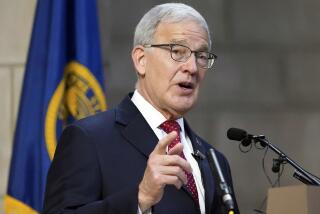Judge Orders Louisiana Ballot Reopened
- Share via
PLAQUEMINE, La. — A Louisiana judge said Monday that Rep. Rodney Alexander had tried to manipulate the fall elections by switching to the Republican Party at the last moment and ordered state officials to reopen the ballot so new candidates could enter the race.
Alexander, who represents a conservative, mostly rural stretch of northeastern and central Louisiana, caused a furor this month when he changed parties after filing as a Democrat. A voter then sued to remove him from the ballot or force him to run as a Democrat.
District Judge Allen Edwards said Alexander’s conversion -- coming so late that no viable Democratic candidate could file to oppose him -- was an attempt “to subvert a fair and honest election process for his own personal gain. His actions were marked by a total disregard for the electorate.” Reopening the ballot would give voters “a real choice,” Edwards said.
His decision caught lawyers for both sides off guard, although each claimed victory.
“It’s unconventional and unexpected,” said Bobby Burchfield, a Washington lawyer used by the GOP in high-profile cases. He said the judge’s comments were “not fair,” but that “at the end of the day, Congressman Alexander will be on the ballot.”
“We believe the statute allowed Congressman Alexander to do what he did,” he added.
Chris Whittington, representing Jeremy Lacombe -- the Democratic voter who sued to kick Alexander off the ballot -- said Edwards “did the fairest thing he thought he could do. We’re going to get a second bite at the apple.”
Late Monday, an attorney for Jock Scott, a Republican candidate already on the ballot, said he would appeal Edwards’ ruling. Under Louisiana law, lawyer Mike Johnson said, state officials can reopen the qualification period only if a candidate dies or no one qualifies for the position. “The only issue of the case was qualification or disqualification of Rodney Alexander. The judge went well beyond that, and his remedy is not in compliance with the law,” Johnson said.
Although the appeal may give Democrats more time to find a candidate, they will be hard pressed to find a contender, said Gordon E. Harvey, a political analyst and professor at the University of Louisiana at Monroe. “Who’s going to want to run against a popular incumbent in a steep, uphill campaign? They’re going to have to get someone at gunpoint, pretty much,” he said.
Trey Ourso, a former director of the Louisiana Democratic Party, acknowledged that locating a viable candidate would be difficult. But “the big news is that the judge essentially said Rodney Alexander deceived voters of the district,” he said. “It validated the plaintiffs that what he did was wrong.”
In a sprawling, 22-parish district that voted for President Bush in 2000, Alexander is favored to win in spite of the controversy, Harvey said.
The ruling capped a hearing that began as a dissection of Louisiana election law. Whittington argued that Alexander in effect withdrew from the race when, after qualifying as a Democrat, he filed again to qualify as a Republican. To support his argument, Whittington cited a state law that says “no candidate shall change or add his political party designation, for purposes of printing on the election ballot, after he has qualified for the election.”
Ty Larkins, a lawyer for the Louisiana secretary of state, said that to legally withdraw, Alexander would have had to have filed a document stating his intention to do so. He added that legislative intent behind the statute cited by Whittington was to save the state from extra printing costs. Since Alexander changed his party affiliation before the ballot was printed, the statute did not apply, Larkins said.
Burchfield -- whose presence in court Monday underscored the importance of the case to the national Republican Party -- argued that “laws should be liberally interpreted to promote rather than defeat a candidacy.”
In the end, Harvey said, Edwards took a “Solomon-like approach [and] ... tried to make everybody happy.”
“The Democrats get to find someone else to put on the ballot, and Alexander gets to stay on the ballot,” Harvey added. “But in doing so, [Edwards] sidestepped the issue: Can you change parties during the qualifying period under Louisiana law? We still don’t know.”
Outside the courtroom, Lacombe listened to a phalanx of lawyers spin the judge’s ruling, then glumly headed toward the exit. “It takes months to put together a viable race,” he said. Alexander “got what he wanted.”
Every candidate will appear on the same ballot under Louisiana’s open primary system. If no one gets more than 50% of the vote, a runoff will be held in December.
More to Read
Sign up for Essential California
The most important California stories and recommendations in your inbox every morning.
You may occasionally receive promotional content from the Los Angeles Times.













